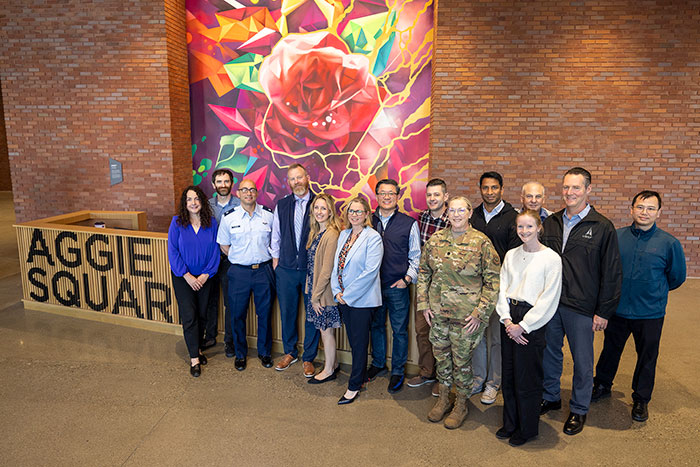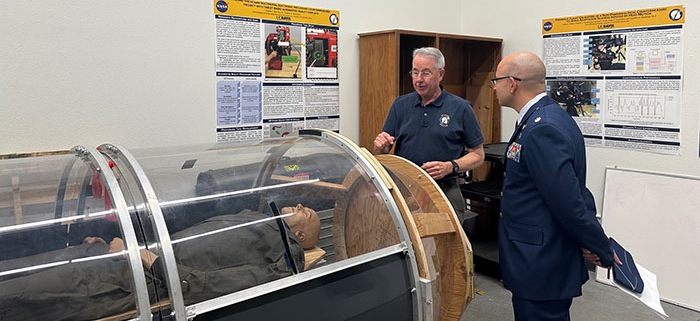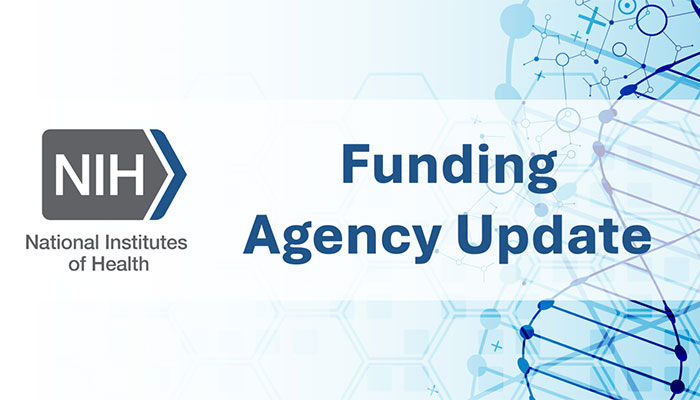U.S. Space Command Official Visits UC Davis: Explores Opportunities for Potential Collaborations for Future Initiatives
Lt Col Bashir El-Khoury, deputy command surgeon of the U.S. Space Command, recently visited (April 3-4) the University of California, Davis, to explore potential opportunities for increased collaboration related to space research and technological innovations. UC Davis became a member of the U.S. Space Command Academic Engagement Enterprise (AAE) in 2024.
The AAE program, established in September 2022, engages with academia to prepare a robust pool of students for roles within the Space Mission Force, advance space applied research and expand partnerships through exchange programs. Targeted research areas include developing human space flight vehicles, reducing space adaption sickness and optimizing operations using artificial intelligence and machine learning.
“The visit enabled a valuable opportunity to explore potential future collaborations that will help advance our research and innovation in space sciences on campus,” said Cristina Davis, associate vice chancellor for Research. “I want to thank Lt Col Bashir El-Khoury for this opportunity to connect and engage with the center’s multidisciplinary team to learn about the different research projects and how best to support our endeavors.”
Understanding challenges and opportunities in space exploration
The visit started at the UC Davis Center for Space Exploration Research, a special research program within the Office of Research, where Lt Col El-Khoury met with faculty members from the Department of Mechanical and Aerospace Engineering including Stephen Robinson, Rich Whittle, Zhaodan Kong, Cristina Davis, Iman Soltani, Mohsen Habibi, Valeria La Saponara, and Jonathon Schofield.
The visit exposed the deputy command surgeon to the center’s interest areas which include spacecraft design, augmentation of human capabilities in hazardous environments, robotics and safety engineering, especially the space ambulance project that allows the center’s researchers to gather data for future designs of emergency reentry vehicles.
The visit presented a unique opportunity to enhance not just a collective understanding of the space environment but to spur innovation that can tackle some of the greatest challenges in space operations. Fittingly, the day concluded with a seminar delivered by Lt Col El-Khoury titled “Artemis and Beyond: Preparing USSPACECOM for the Next Stages of Human Exploration”.
“The command enjoys a variety of academic partnerships where we collaborate and accelerate applied research like the challenges and opportunities in human space flight support,” said Lt Col El-Khoury. “Today’s robust discussion demonstrates a shared commitment to growing a space coalition focused on peaceful exploration.”
Scope for future collaborations with UC Davis Health experts

The next day, on April 4, Lt Col El-Khoury visited UC Davis Health to meet with a distinguished group of faculty leaders and researchers, including Drs. Rachel Michelle Russo, Rachael A. Callcut, Pranav Shetty and Rachel Ann Hight. The visit centered around advancing long-term collaborative research to enhance space superiority, exploring the integration of AI, data science, and biomedical innovation in defense medicine, and addressing readiness for large-scale combat operations.
The team emphasized the nearly 30-year military-civilian partnership between UC Davis and the US Air Force, serving as a model for similar partnerships nationwide. They were joined by collaborators from the Clinical Investigation Facility at Travis Air Force Base to discuss ongoing Department of Defense and NASA projects.
Lt Col El-Khoury also engaged in in-depth discussions about austere medicine, future warfighter needs, and the strategic alignment of UC Davis programs with the Department of Defense’s emerging priorities. A robust open discussion, hosted by the UC Davis Trauma Division, fostered dialogue on the development of a resilient medical workforce and translational research in combat casualty care.
The visit included a tour of Aggie Square, UC Davis’s innovation district, opening its first phase in May, which showcases facilities for accelerating biomedical innovation, interdisciplinary collaboration, and research for national security. Aijun Wang, professor and vice chair in the Department of Surgery and Biomedical Engineering, discussed opportunities for improving Guardian health and safety through biomedical research and point-of-care therapeutics.
Lt. Col. El-Khoury’s insights were instrumental in shaping ongoing and future research initiatives at UC Davis. The visit underscored key areas of mutual interest. It established a foundation for future collaborations, including potential partnerships in Aerospace Medicine and a long-term vision for a possible University Affiliated Research Center focused on combat casualty care and warfighter readiness.







